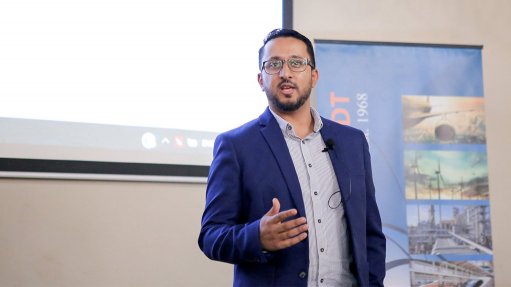
ABDUR-RAHMAN MAHOMED Using a nonreputable company provides you with a false sense of security and you save a very small percentage of what you could lose if a component fails
Clients using nondestructive testing (NDT) services are sometimes unfamiliar with NDT, and it is crucial that they educate themselves prior to spending money on NDT inspections, says technical solutions specialist African NDT Centre Level 3 consulting manager Abdur-Rahman Mahomed.
“Clients should always ensure that they understand what is required and communicate this to the NDT supplier. Far too often, clients do not know what code or specification they are working to or what acceptance criteria must be applied,” he tells Engineering News.
He notes that clients who occasionally use NDT could perhaps read up online to get a general understanding, while clients that typically require about 40 hours of NDT services per month may want to enrol their engineer or contact person in an NDT appreciation short course. Clients that require more than 160 hours of inspections per month should further consider occasionally having some of the NDT services verified by a third party, he recommends.
Further, Mahomed states that clients frequently spend more money on idle time, as they do not prepare their components, which must be cleaned before most inspections can be done – prior to inspections.
Moreover, he emphasises that clients should not accept the fastest turnaround time or the cheapest quote. For example, in the medical industry, if a person required X-rays, it is unlikely that they would consider using an uncertified or unlicensed practitioner or someone that will do it for a fraction of the price.
With NDT, as with everything else in life, “you get what you pay for”, Mahomed states.
“Using a nonreputable company to provide you with a false sense of security may save costs in the short-term by paying less and not having identified many repairs. However, what you save is a very small percentage of what you could lose if a component fails – unscheduled downtime costs, catastrophic failure or failure that results in injuries or deaths.”
This can be mitigated by using a well-known or highly reputable company, but Mahomed reiterates that the client should have a basic knowledge of NDT, including a basic knowledge of codes, specifications and procedures to prevent “having the wool pulled over their eyes”.
African NDT Centre training manager Evashan Maistry-Thavar believes that choosing the cheapest option is fuelled by NDT not being taken as seriously as it should because NDT is not formally recognised as a profession in South Africa.
The NDT industry rarely gets the recognition it deserves and, as with any industry, it is full of people who are passionate about and dedicated to improving the industry locally and internationally, he adds.
Improving Industry
Mahomed highlights that the African NDT Centre has been involved in the research and development of inspecting carbon fibre composite materials in various configurations, noting that such inspections are a challenge internationally.
“We are experienced in the sector and are hopeful to pioneer it from a Southern Africa perspective,” he comments.
The company has also been developing a diverse stable of specialist consultants and he believes that it has one of the largest NDT Level 3 professional teams in Southern Africa.
The team has various method specialisations, with members also having various industry backgrounds, providing clients with an added advantage regarding problem solving, he enthuses.
African NDT Centre aims to continue to expand its footprint further into Africa, Mahomed concludes.